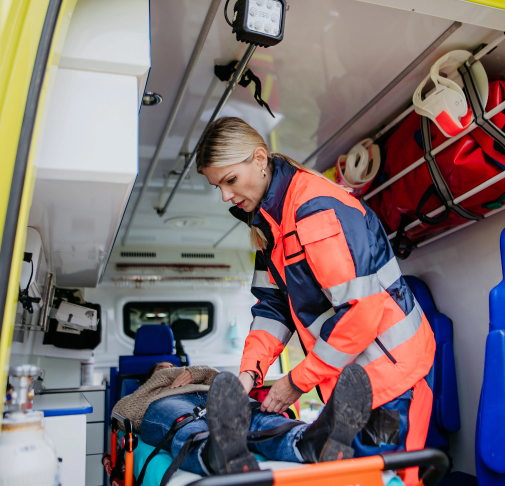Bachelor’s in Paramedicine
Serve on the Frontlines of Emergency Medical Care
Ready to serve emergency medical and healthcare at the next level of your career? Study paramedicine with this online program! With an online BS in Paramedicine program, you can gain the tools you need to maximize health and well-being for patients experiencing injury, illness, and other medical or health emergencies. If you are looking for a bachelor’s in paramedicine, take a look at how this flexible, online program can help you achieve your career goals.
This 100% online bachelor’s degree in paramedicine draws from a number of disciplines, from human development to pathophysiology, to help you develop a well-rounded approach to emergency medical care. Designed for licensed paramedics, the paramedic science degree online aligns with best practices for emergency medical services through a clinical focus. Complete your bachelor’s-level paramedic degree online at your own pace in as little as two years!
Program at a Glance
2-4 years
Duration
120
Credit Hours
$495
Cost per Credit
100%
Online
Awards & Recognitions

Top Ranked
Best Online Paramedicine Programs

Course Spotlight
Your online bachelor’s in paramedic program coursework is enhanced through a number of elective course options that can refine your ability to deliver medical care and fulfill your career goals. The BS in Paramedicine examines the foundations of human health and healthcare, covering focuses such as the following:
- Medical Terminology
- Pharmacology
- Human Anatomy & Physiology
- Foundations of Public Health
Career Outlook
Graduates of our paramedic bachelor’s degree have the opportunity to impact health and well-being in a number of medical and healthcare settings. A bachelor’s degree in paramedicine can help prepare you for the rewarding challenges of roles such as EMT, firefighter, medic, flight paramedic, and more.
Admissions Requirements
For admission to your bachelor’s in paramedicine program, you will need to complete your online application and submit the following documents:
- Online Application
- Official transcripts
All colleges and universities previously attended. If you have fewer than 24 college credits, you will need to submit your official high school transcript. - Current state paramedic license or national registry paramedic certification
- Documented U.S. military medic training or state or national registry paramedic certification and experience
If cumulative college GPA is below a 2.0, the following will also be required:
- Résumé
- Letter of intent/personal statement
(1–2 page document indicating your interest in the program and Lindenwood)
Tuition Details
The cost per credit hour for this paramedic science degree online program is $495. Besides affordable tuition, we offer a generous transfer policy of up to 90 credits toward your degree completion to further offset tuition costs—to save you time and money on your education!
Frequently Asked Questions
The BS in Paramedicine program requires a current state paramedic license or national registry paramedic certification for admission, along with documented U.S. military medic training or national registry paramedic certification and experience.
The online BS degree in paramedicine allows you to transfer up to 90 credits. Learn more about our transfer policy.
No. We do not charge any fees in addition to tuition for our online paramedic bachelor’s degree.
Yes, there are scholarships available for this undergraduate paramedic degree online program Find out if you qualify for a scholarship with your admissions representative.
Why Choose Lindenwood University Online?
Since 1832, Lindenwood University has served students worldwide with affordable, high-quality academic programs providing real experience and real success. After nearly 200 years of academic excellence, Lindenwood is committed to a set of core values, including integrity, dedication, excellence, creativity, and community.
Quality
We evolve our online degree programs to reflect the latest in academic research and innovation and to meet the top standards of higher education.
Affordability
We are committed to offering our students studying online low tuition rates on top of multiple ways to save on your education.
Career-Focused
Our programs align curriculum to industry realities from experienced instructors who share real-world insights.
Support
We employ experts who are dedicated to helping our students with financial aid planning, enrollment counseling, tutoring services, and more.
We are committed to helping you succeed.
Throughout each step of your online degree program, you will receive support. From enrollment and tuition planning to staying on the right track, your support team is there to ensure your success.
